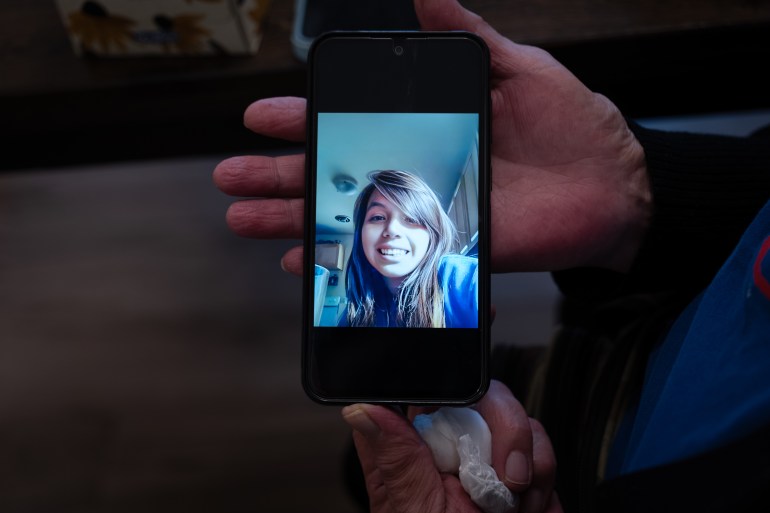Donna Bartlett sits at a wooden kitchen table, her slight frame perched on the edge of her chair. With its warm lighting and walls adorned with artwork by Indigenous artists, Candace House, a one-of-a-kind support centre for families affected by violent crime in downtown Winnipeg, feels a long way from the cold, sterile court two blocks away.
The 67-year-old spent countless hours here during Skibicki’s six-week trial last summer. During those gruelling weeks, the families of the murdered women would gather around this table, sometimes sitting in stunned silence; at other times sharing stories about their loved ones over cups of tea.
“We would come back from court and just … collapse,” Donna says, looking around the kitchen as if seeing the ghosts of those difficult days. “None of us could have made it through without this place. Some days we couldn’t even talk about what we’d heard. Other days we couldn’t stop talking.”
Donna is Marcedes Myran’s grandmother. She is talking on what would have been Marcedes’s 29th birthday. The staff at Candace House have bought a chocolate cake – Marcedes’s favourite. “She loved chocolate everything,” Donna explains, her hand resting protectively on the white cake box. She’ll take the cake home to Marcedes’s children.

In the quiet of Candace House, Donna remembers her granddaughter as mischievous and full of life, always playing pranks on her kokum.
“She loved to hide my shoes,” she recalls with a soft laugh. “I’d be getting ready to leave … and suddenly my shoes would be gone … She’d say, ‘But Kokum, you can’t leave without your shoes!’ Then she’d giggle so hard she’d give herself away.
“And she was always hiding behind doors or furniture to jump out and scare me. Even when I knew she was going to do it … I’d still jump and scream, and she’d laugh that big laugh of hers.”
But there was something the young Marcedes enjoyed even more than playing pranks on her grandmother. From the age of 12, she harboured a deep love for poetry, inspired by a teacher who introduced her to the work of the Mi’kmaq poet Rita Joe.
“The day she came home with that poetry book, something just clicked for her,” Donna says. “She started writing about everything – the seasons, her feelings, our family history.”
Marcedes would fill notebooks with verses about her dreams for the future, her observations of nature, and later, as a teenager, the challenges of being Indigenous in a world that often misunderstood her.
Donna would find scraps of paper with her poems scattered around the house, tucked under cushions, folded into books. “She wrote like she couldn’t get the words out fast enough,” she reflects.
Now Donna cherishes those poems, taking them out to read and wondering what the future would have held for her granddaughter had Skibicki not taken it away.
“She believed in people. She would trust them, helping them and talking to people, you know? That’s what got her in trouble. Her trusting nature,” Donna says as she shakes her head.
When Marcedes and her three siblings were very young, Donna took them in. Donna’s oldest daughter was struggling with addiction and knew her mother would take good care of her children. Their mother would visit when she could – sometimes staying for weeks when she was doing well, but disappearing for months during relapses.
“I raised them the best I could,” Donna says, her voice dropping to a near whisper. “Worked two jobs sometimes.”
But as a young mother herself, Marcedes faced the devastating loss of her two children to the child welfare system. The children were initially taken during a wellness check when the authorities found inadequate food in their apartment. What was intended as a temporary measure became permanent as Marcedes struggled to meet the requirements for reunification while battling housing instability.
“Losing those babies broke something in her,” Donna says. “She’d been such a good mother – reading to them every night, making sure they had what they needed.”
Marcedes turned to substances to numb the grief she felt at being separated from her children. For two years, she cycled between periods of determination to regain custody and devastating relapses.
Then she was offered a bed at a live-in treatment facility. Donna remembers her granddaughter’s excitement when she called to share the news. “She said, ‘Kokum, this is it. I’m going to get clean, get my babies back, make you proud.'”
It was the last conversation they had.

On December 1, 2022, Donna got a call from the Winnipeg police. After months of searching and waiting for news about Marcedes, they had an update and asked Donna to gather the family at her home. It was the worst day of Donna’s life.
“That day changed us all,” she says.
“They [the police] told us everything, that she was murdered and where she was. They told us they had the perpetrator in jail and they weren’t going to dig the landfill because they had enough evidence to convict him. We were just like, why?”
The days melted into each other after that, Donna says. The sun rose and set without meaning. She would find half-drunk cups of tea she had no recollection of making, and find herself standing in rooms with no memory of walking into them. But she had to pull herself together for her great-grandchildren.
“My sisters came over and we talked about doing a funeral for her, even though we didn’t have her body. So, we had a memorial here for her friends and street friends. And then we had a funeral at Long Plain,” she says.
